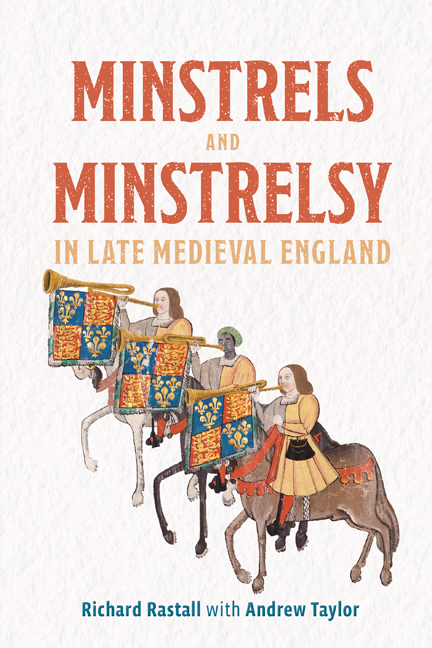Book contents
- Frontmatter
- Dedication
- Contents
- List of illustrations
- List of music examples
- List of abbreviations
- A note on references
- A note on money
- A note on dates
- Preface
- Acknowledgments
- Part I Minstrels and Minstrelsy in the Elite Households
- Part II Urban Minstrelsy
- Part III On the Road
- Part IV Minstrel Performance
- Envoi
- Bibliography
- Index
8 - Minstrels on the road
Published online by Cambridge University Press: 09 January 2024
- Frontmatter
- Dedication
- Contents
- List of illustrations
- List of music examples
- List of abbreviations
- A note on references
- A note on money
- A note on dates
- Preface
- Acknowledgments
- Part I Minstrels and Minstrelsy in the Elite Households
- Part II Urban Minstrelsy
- Part III On the Road
- Part IV Minstrel Performance
- Envoi
- Bibliography
- Index
Summary
The minstrel as traveller
The romantic myth is that the medieval minstrel was a wanderer, going from place to place as the whim took him, welcomed everywhere but constantly moving on. Minstrels did travel, certainly: but it was a purposeful travelling, always in search of reward and usually on a well-beaten path. Independent minstrels often found frequent working of a relatively small area to be fruitful, especially if there were local institutions that needed entertainers on particular occasions. Towns and religious houses celebrated certain events annually, for instance, and multiple saints’ days gave multiple opportunities for work.
For the minstrels of the great lords, travelling was often an annual event, undertaken in the summer months when they were not required in the household, and the distances travelled might be two hundred miles or more. A liveried minstrel might also travel for another reason. In any major household the administration of often widely-separated estates, the processes of government and the maintenance of social networks demanded a large traffic of correspondence. Some messages could be carried in the memory, others in the form of sealed letters. Apart from the heralds, who were used for occasional diplomatic and chivalric announcements, the king employed full-time messengers: the mounted nuncii, and the cokini (cursores from Edward II's reign), who travelled on foot.
The sheer quantity of traffic in these constant communications between households often required other household servants to carry both written and verbal messages: clerks, chaplains and others, including minstrels, depending on the nature of the task and who was available. John the trumpeter was described as cokinus when he was paid his expenses on 31 March 29 Ed I (1301), and appears amongst nuncii when reimbursed for carrying the king's letters at an unknown date in the same regnal year. This was probably John de Depe, who is known to have carried letters at about this time, or perhaps a man employed primarily as a messenger and who was competent at blowing the necessary signals on a trumpet.
In lesser households the task of carrying letters might fall to any suitable servant who could be spared.
- Type
- Chapter
- Information
- Minstrels and Minstrelsy in Late Medieval England , pp. 167 - 182Publisher: Boydell & BrewerPrint publication year: 2023

